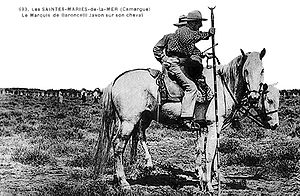Folco de Baroncelli-Javon
| Folco de Baroncelli-Javon | |
|---|---|

Baroncelli in full gardian attire
|
|
| Born | 1 November 1869 Aix-en-Provence |
| Died |
15 December 1943 (aged 74) Avignon |
| Occupation | writer, cattle breeder, cultural activist |
| Nationality | French |
| Period | early 20th century |
| Literary movement | Félibrige |
| Relatives | Jacques de Baroncelli (brother); Georges Dufrénoy (brother-in-law) |
Folco de Baroncelli-Javon (1 November 1869 – 15 December 1943), was a French writer and cattle farmer. As an influential gardian (a kind of Provençal cowboy), he is an important figure in the traditional lifestyle and culture of the Camargue region of southern France.
Though born in Aix-en-Provence, Falco de Baroncelli-Javon was baptised in Avignon, where his parents lived. He came from a Florentine family who had settled in Provence in the 15th century, occupying a building in the centre of Avignon then called the Baroncelli Palace (now the Palais du Roure). His father's side of the family were of Tuscan origin and part of the Ghibelline tradition, and they were hereditary Marquises of Javon. Though somewhat aristocratic, the family spoke Provençal, which was rather controversial at a time when it was considered to be a language of the common people.
His brother was Jacques de Baroncelli, later a famous film director, and his sister, Marguerite de Baroncelli-Javon, later became ‘queen’ of the Occitan cultural movement known as the Félibrige, and married the post-impressionist painter Georges Dufrénoy.
In 1895, lou Marquès (‘the Marquis’), as he was then known, moved to the Camargue and raised a herd of cattle called the Manado sentanco (the ‘holy herd’) in Saintes-Maries-de-la-Mer. He married the daughter of a Châteauneuf-du-Pape landowner, and had three daughters, but his wife did not take to the climate of the Camargue and their life together was patchy. Nevertheless, he settled in Saintes-Maries-de-la-Mer and became a tenant of a , or traditional ranch, called the Mas de l'Amarée.
...
Wikipedia
